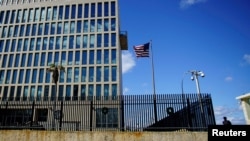A series of brain injuries and other serious health ailments that struck hundreds of U.S. diplomats and intelligence officials was almost certainly the work of a U.S. adversary, according to a new report by U.S. lawmakers, who accuse the nation's intelligence agencies of trying to hide the truth.
The ailments, which the U.S. government calls anomalous health incidents, or AHIs, but are commonly known as Havana Syndrome, were first publicly reported among diplomats and other employees at the U.S. Embassy in Havana, Cuba, in 2016.
Symptoms range from nausea and dizziness to debilitating headaches and memory problems, with cases having been reported in Russia, China, Poland, Austria and the United States.
A March 2023 intelligence assessment concluded that despite some initial suspicions, the illnesses that afflicted and, in some cases, incapacitated U.S. personnel were "very unlikely" to have been caused by any of America's enemies.
But the report released Thursday by a House intelligence subcommittee calls that finding and other conclusions by the Office of the Director of National Intelligence, which oversees 17 U.S. intelligence agencies, and the CIA, the nation's premier spy agency, nothing more than an effort to "create a politically palatable conclusion."
"It appears increasingly likely and the chairman is convinced that a foreign adversary is behind some AHIs," the report said.
"The IC [intelligence community] has not been a willful participant in Congress's oversight of this subject, despite the impact AHIs have had on IC personnel," the report added. "Instead, the IC has hindered this subcommittee's efforts to understand AHIs, their cause and effects, and how the IC reached their conclusions."
The report further accuses the U.S. government's 2023 assessment of using faulty methodology.
Lawmakers said the new report is based on dozens of interviews of former intelligence and military officials, as well as of medical experts, and included a review of thousands of pages of documents and evidence provided by U.S. intelligence agencies.
"There is reliable evidence to suggest that some anomalous health incidents are the work of foreign adversaries," said CIA Subcommittee Chairman Rick Crawford, a Republican.
"Our investigative work through the CIA Subcommittee will continue until we get full cooperation and thorough answers," he added.
A national security lawyer who represents more than two dozen victims of Havana Syndrome welcomed the interim report's findings.
The report "is consistent with everything I have learned over more than a decade representing AHI victims," Mark Zaid told VOA in an email Friday, noting that some of his clients provided testimony to congressional investigators.
"Having had authorized access to classified information on the topic, I agree that CIA/ODNI, in particular, are intentionally covering up the truth regarding the likelihood of a foreign adversary causing at least some of the AHI attacks," he added.
Some lawmakers and U.S. intelligence officials have pushed back.
The ranking member of the House Intelligence Committee skewered the report, describing it as sloppy, while accusing Republicans on the committee of playing games and going so far as to publish the interim report without first sharing it with committee Democrats.
The new report "has uncovered no new evidence to support the conclusion of adversary involvement or evidence of improper analytic process," Democratic Representative Jim Himes said in a statement.
"I have seen no evidence that the U.S. government was not determined to find the root cause of these incidents and to protect the men and women who go to work around the world every day to safeguard our nation," Himes added. "Nor have I observed the IC do anything to impede the subcommittee's investigation."
The ODNI and the CIA, likewise refuted the committee's conclusions.
"The [intelligence community] does not agree with many of the report's interim findings," an ODNI spokesperson told VOA.
"Most IC agencies assess that it is very unlikely a foreign adversary is responsible for the reported AHIs, and the assertion that we are withholding information that contradicts this analysis or would otherwise illuminate this complex subject is unfounded," the spokesperson added.
The CIA also challenged the report's conclusions while rejecting accusations that it sought to hinder lawmakers in their investigation.
"Any suggestion that we are withholding information that would shed new light on this complex and difficult issue could not be further from the truth," a CIA official told VOA, agreeing to share details on the condition of anonymity.
"No one cares more about understanding this than we do," the official said. "These are our friends and colleagues."
"We applied the agency's very best operational, analytic and technical tradecraft and our very best personnel to what is one of the largest and most intensive investigations in the agency's history," the official added.
Yet despite the insistence by U.S. intelligence officials that most cases of Havana Syndrome can be explained by a combination of preexisting medical conditions and environmental and technical factors, experts and outside investigations have raised persistent doubts.
A February 2022 report by a panel of experts warned that the core symptoms in a small number of cases were "distinctly unusual and unreported elsewhere in the medical literature" and suggested some sort of device must be responsible.
"Pulsed electromagnetic energy, particularly in the radiofrequency range, plausibly explains the core characteristics," the 2022 report said.
And an investigation in April by CBS' 60 Minutes, Germany's Der Spiegel and The Insider also found there is reason to believe that the U.S. intelligence assessment came to the wrong conclusion.
The news organizations said a review of travel documents and mobile phone records, along with eyewitness testimony and interviews with multiple U.S. officials and victims, shows that Russia is likely to blame.
Specifically, the investigation tied numerous reports of Havana Syndrome with the presence of members of Unit 29155 of Russia's military intelligence service, known for its role in sabotage and assassinations. It also found that members of GRU Unit 29155 had received awards and promotions for their work on sound or radio frequency-based directed energy weapons.
But the CIA official who spoke to VOA again rejected the notion that Russia was behind such attacks, despite the CIA director's initial suspicions.
Director William Burns "had his own assumptions when he became director — so much so, that he even warned his Russian counterparts in late 2021," the official said.
But the official said the CIA's work "indicates that some of our assumptions about early AHI reports, including in and after Havana, were incorrect."


